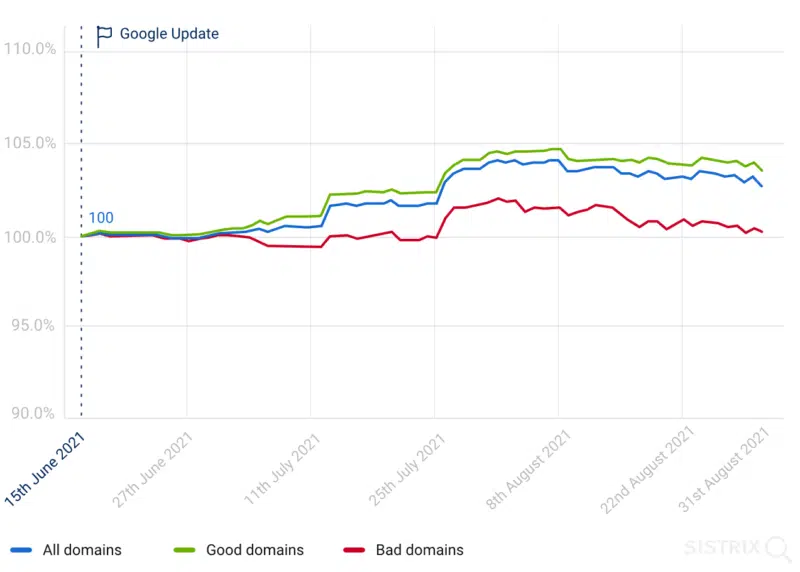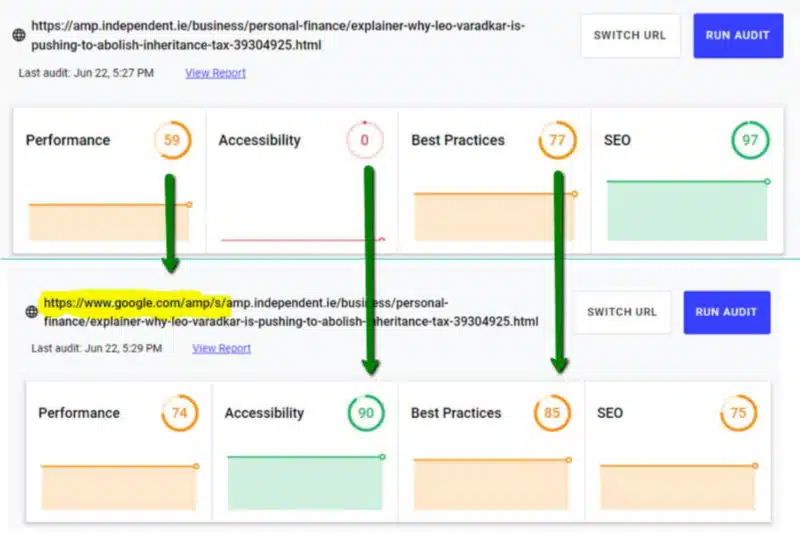Whether Google manipulated AMP or not, it’s a great time to reassess using it
If the allegations from 17 state attorneys general are true, we’ll likely all ditch AMP. But even if they’re not, the page experience update is now live and we have a clearer idea of what the possibilities and compromises are without AMP.
As soon as Google announced that its Accelerated Mobile Pages (AMP) framework would no longer be required to appear in the Top Stories section of its search results, SEOs working with publishers began envisioning more ad revenue opportunities without sacrificing the traffic that Top Stories could bring. However, some publishers may feel “stuck” with the framework due to a lack of developer resources or other factors.
But, in light of recently unredacted allegations from 17 state attorneys general accusing Google of throttling non-AMP ads in order to give AMP a “nice comparative boost,” publishers that are still using AMP may be raising an eyebrow of suspicion. “We’ve all known for a long time that AMP was Google’s attempt to force its own paradigm onto the web, a way to try and control the chaos and establish its own methods as a standard way of doing things,” said Barry Adams, independent SEO consultant and co-founder of News and Editorial SEO Summit, “These latest allegations, if true, show just how far Google’s greed can reach, that it would artificially penalize websites that don’t use Google’s preferred approach,” he said, citing 2018 accusations that Google slowed down YouTube for Firefox users as precedent for such conduct.
While the allegations carry huge implications, the fact of the matter is that, until proven in court, search marketers simply won’t know if they’re true. Nevertheless, the page experience update is now fully rolled out and we have a clearer idea of what the possibilities and compromises are without AMP.
Considerations for abandoning AMP
“If these allegations are true, this would be morally wrong on Google’s end,” Daniel Smullen, head of SEO at Mediahuis IRL, said “But, let’s be honest, most publishers adopted AMP due to its Top Stories eligibility requirement. Not due to its ‘perceived’ speed-boosting effect.” The Top Stories offers publishers greater visibility in search results, which may potentially attract more traffic than a standard search listing. “If there was ever an anti-trust element to AMP, it was this,” Smullen added.
But, AMP is no longer required for Top Stories. AMP became a requirement to appear in the Top Stories carousel in 2016. Last year, Google announced that AMP would no longer be required for its Top Stories section, opening it up to pages that do well in terms of page experience scores.
While the page experience update didn’t have the impact some SEOs were expecting (Google did say that “sites generally should not expect drastic changes”), non-AMP pages are now appearing in the Top Stories section: On October 27, 2021, non-AMP URLs accounted for 24.6% of Top Stories content in the U.S., according to Newzdash’s AMP Tracker tool. In certain countries, this ratio can be much higher — in the Netherlands, it was 80.9% on the same date.

Know your Vitals. Your current user experience needs to be taken into account when evaluating whether to maintain, abandon or adopt AMP. “In my opinion, if publishers are failing all three Core Web Vitals metrics, and if they care about competing on search, continuing with AMP, from a business perspective, may make the most sense,” said Smullen.

“Moz, in its recent page experience ranking factor study, has shown that passing all three Core Web Vitals metrics did not add a significant enough advantage over passing two of the metrics,” he said. A study by SISTRIX also found that pages that meet all three CWV requirements ranked just 1% better than the average for all domains, but pages that failed at least one CWV metric ranked 3.7% worse (according to SISTRIX’s Visibility Index).

While passing all CWV metrics does not guarantee inclusion in the Top Stories section, it can act as a “tie-breaker” when your content performs similarly to that of your competitors based on other ranking factors. And, “[It is] important to note that failing all three did suggest a ranking dampening effect,” Smullen added.
Revenue considerations. “We have to weigh the pros and cons of having a website that relies on advertising for revenue which, at times, doesn’t give us the [performance] metrics we would like,” Matt Dorville, SEO manager at BuzzFeed, told Search Engine Land shortly after the announcement. Being free of AMP may enable publishers to seek out more ad revenue opportunities, but they’ll have to weigh that revenue against potentially longer load times from showing those ads.
Internal bandwidth. Improving your user experience to the point where it can compete with other publishers that might be using AMP may fall on your developers, who might already be stretched thin: “It’s been a really, really tough time to say, ‘We’re going to put a priority on certain things, like tickets for our site that will help speed, that will help things in the page experience,’ but at the same time we have fewer engineers, we have less bandwidth, we have fewer people on staff to go and do that,” Dorville said, noting that some publishers may be operating with a smaller staff and tighter budgets due to the economic impacts of the pandemic.
Major site changes. Conversely, major site changes, like a redesign or switching to a different CMS, may make maintaining AMP more difficult. “For publishers that are already up and running on AMP, I think the decision point will be when the site goes through any major overhaul,” Matthew Brown, managing director at MJBLabs and former director of search strategy for the New York Times, previously said, “Then the costs of updating everything to AMP starts to look less favorable given it’s no longer a requirement for Top Stories.”
For some, AMP may still be a viable alternative
There are many push-and-pull factors to be considered when deciding whether to stay with AMP or get rid of it. AMP typically does provide a snappy page for your users, and “[It] offers strong page experience scores out of the box for publishers once their AMP code validates to ‘Google’s’ standards,” Smullen said, “AMP also gets a page experience advantage on search engine results pages due to its caching technology named the AMP Cache.”

“This is where Google, on its own servers, further optimizes the publisher’s valid AMP code,” he said, “Whether Google artificially inflated the comparison of AMP versus non-AMP, the speed-boosting impact of the AMP Cache is not a hoax.”
But as always, test before taking the dive
At this point, any allegations against Google are yet to be proven in court. However, if it makes sense for your publication to start investing in user experience instead of maintaining AMP, “I’d advise doing that on a per-section basis, starting with relatively low traffic sections of the site, to see what the impact on traffic is,” Adams recommended, “The case studies we’ve seen so far suggest that deleting AMP, when done right, doesn’t result in any significant loss of traffic, providing the site’s Core Web Vitals (for non-AMP articles) are fairly healthy. And even a small traffic loss is likely to be worthwhile when getting rid of AMP, due to the increased monetization of non-AMP articles.”
Contributing authors are invited to create content for Search Engine Land and are chosen for their expertise and contribution to the search community. Our contributors work under the oversight of the editorial staff and contributions are checked for quality and relevance to our readers. Search Engine Land is owned by Semrush. Contributor was not asked to make any direct or indirect mentions of Semrush. The opinions they express are their own.


